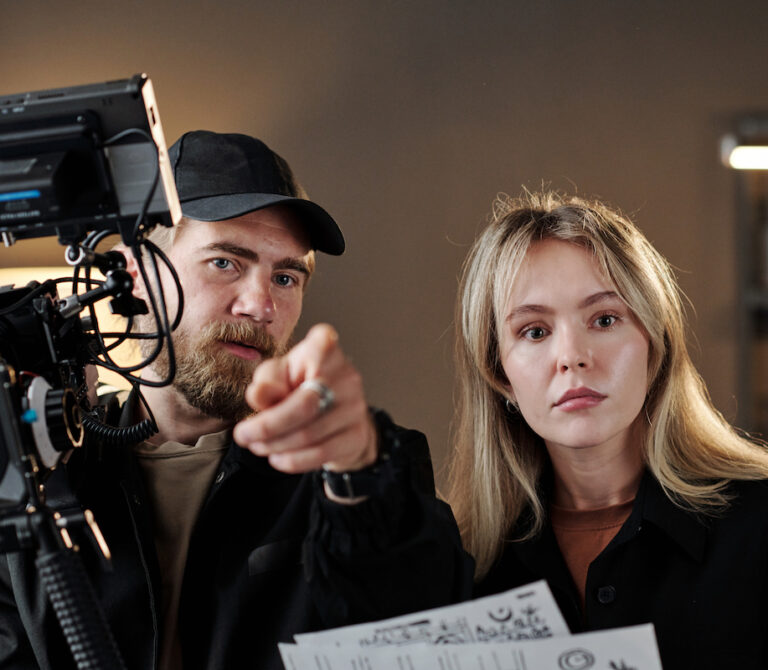Voice over directing is like the invisible hand guiding voice actors behind the microphone, shaping stories and characters. But a voice director doesn’t just sit on a chair yelling, ‘cut’ or ‘action.’ With a keen eye for detail, a sharp ear for tone, and a gentle tongue for constructive communication, they use their understanding of vocal techniques, script analysis, character development, and narrative pacing to inspire thrilling performances in diverse voice over projects.
At Voice123 – where you’ll find professional voice actors – we’ve got the best insights on voice direction in 2024. In this post, we’ll explore valuable pointers on remote voice direction and the significance of voice over direction in AV projects.
Voice over directing – from dialogue to diction!
What is voice over directing?
Voice over directing is a specialized form of voice direction that guides voice actors through a vocal performance to meet a project’s creative vision during recording sessions. A voice over director will provide real-time feedback and script interpretation on projects like animations, video games, commercials, or audiobooks. Compared to traditional directing, voice over directing guides actors based on their tone, style, and vocal nuances. However, there are no visual props or scenes since everything occurs in a recording booth. So, the voice director must understand a voice performance’s technical and vocal aspects to capture the right vocal style for different scripts.
What does a voice director do?

A voice director is responsible for all aspects of voice recordings, from casting to directing studio performances in productions like animation, video games, commercials, or dubbed content. They conduct rehearsals, provide feedback, and occasionally assist in the final editing process so the dialogue fits the visual elements. Other duties include interpreting the script, understanding the principal director’s or producers’ vision, and ensuring that the voice actors’ performances align with that vision. A voice director must have strong communication skills and a keen ear for vocal nuances to provide a positive, creative environment despite the pressures of tight deadlines.
Why is voice over direction vital?
Voice direction is a vocal guide; it helps voice actors navigate the intricacies of their characters so each line they speak sounds authentic to audiences. Without proper voice direction, even compelling scripts risk losing their appeal – leading to disconnections between characters and the audience, unclear voice tones, and dialogue that misrepresents a character’s emotions or motivations. Skilled voice direction, however, makes character voices come alive to audiences, like Dory’s upbeat, forgetful nature in Finding Nemo. When director Andrew Stanton heard Ellen DeGeneres speak during her TV show, he changed his original character design, instead writing Dory’s role for DeGeneres. So, once a voice over director understands the tone, emotion, and pace of the voices he’s working with, he can focus on how to draw out their specific nuances for any role.
How to direct a voice actor
- Provide a thorough brief: This helps voice actors understand the script’s purpose, target audience, and the best emotional tone they need to use for a delivery.
- Share the script in advance: Give the voice actor enough time to review, practice, and become more familiar with the script’s flow. This contributes to character dynamics, especially when other voices are involved.
- Offer character insights: If you need a specific character voice, provide background information not included in the dialogue, like the origin story, to help the voice actor understand the character’s motivations and personality.
- Encourage exploration: While you have a specific vision, voice actors have individual interpretations, and their experience can uncover valuable unexplored vocal nuances of a performance.
- Communicate clearly and constructively: Be specific about your requirements for different lines and scenes. If a take doesn’t match your vision, use constructive feedback to focus on what to change instead of what didn’t work.
- Use read-throughs: Pre-recording read-throughs help iron out pacing or other vocal issues so you and the voice actor can become more comfortable with the script and work together.
- Create a positive environment: Voice acting can be intensely personal and sometimes emotionally draining. Try to maintain a supportive, patient atmosphere to draw out a voice actor’s best performances.
How to direct a voice actor remotely
- Pre-session prep: Before the session, send the voice actor all necessary materials, like the script, character descriptions, and specific directions or emotions they need to prepare.
- Technical check: Before the session, check your internet connection and recording equipment to troubleshoot potential issues with mics, headphones, or software in advance.
- Use reliable tools: Professional software will give you high-quality audio recordings and allow you to share files easily. Commonly used tools are Source-Connect, ISDN, or IPDTL.
- Conduct a live-directed session: Use live sessions to direct projects using video calls, as this provides real-time feedback and direction and makes the process more dynamic and collaborative.
- Provide clear direction: Be specific and use descriptive, clear language and examples to communicate the tone, pace, and emotions you’re after. Try to avoid vague instructions.
- Be encouraging: Remote voice acting can be even more challenging because of the distance. So, a voice director must be encouraging and offer positive feedback to maintain a productive atmosphere.
- Follow up: After the session, review the recordings and provide feedback or requests for re-takes immediately while the session is still fresh in everyone’s mind.
Final Thoughts on voice over directing

Whether in-studio or remote – voice over directing is the foundation of successful projects. It paves the way for smooth communication, constructive feedback, and a supportive environment for voice actors to deliver their best performances. So, a voice director, combined with a skilled voice actor, is the heart and soul of a project.
Got a killer idea for your next voice over project? Work with the skilled voice actors on Voice123. Or hire our Managed Services to let them handle your project from start to finish.
Voice direction – where tones meet tales!
FAQs on voice over directing
You need a combination of education in film or sound production and experience in voice acting or audio production. You can also work your way up by networking with other pros or starting out with assistant roles.
Yes, voice actors work under the guidance of voice directors on animated films, video games, and dubbing projects. The director ensures that the vocal performances match the project’s vision.
You must understand the technical aspects of sound recording and be able to guide and inspire voice actors to deliver performances in supportive, collaborative environments.
They typically look for voice actors with versatility, emotive depth, and consistency, and if they can accept direction and adapt their delivery based on feedback.



































































